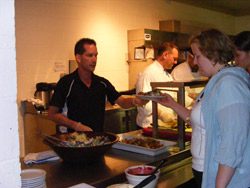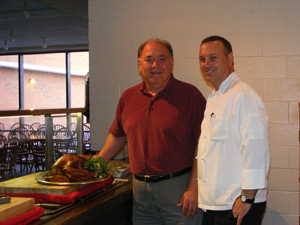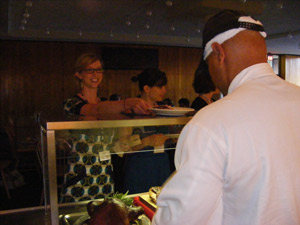Filed Under > TC Community
Intense Learning, Amazing Food
A-list chefs keep teachers talking and learning at the Klingenstein Center's two-week Summer Institute for Early Career Teachers.
Within minutes, the guests of honor arrived: a small army of hungry teachers from independent schools around the country. They were gathered at the southern New Jersey boarding school to take part in the Summer Institute for Early Career Teachers offered by Teachers College’s Klingenstein Center for Independent School Leadership. In sneakers and shorts, plastic trays in hand, the ambiance they suggested was distinctly cafeteria--but as they quickly discovered, dorm food this was not. On the menu this evening in late June was not only smoked turkey, but also deep-fried Long Island duck, fresh-baked jalapeño corn bread muffins with local honey-whipped butter, Southern style cole slaw, tri-color roasted potato salad, and even some vin rose.
“Smoking food takes me back to summers and family,” said Duda, creator and host of the A&E television series The Well-Seasoned Traveler and founding Executive Director of Astor Center, the food and beverage education and event venue in New York City. “This is what this kind of thing is all about: people coming together. I used to tell my wife that I wanted to be a four seasons chef, and when the summer time came around I’d cook under a tree somewhere. Well, at Lawrenceville, I get to cook under that tree—in a way.”
Hiring chefs the likes of Duda may seem like an extravagance--the province of exclusive corporate retreats at far-off resorts--but the Klingenstein Center has made great food part and parcel of its intensive, two-week institute. And extravagance has nothing to do with it.
“The food is almost a metaphor for everything we do at the Institute,” said Klingenstein Center Director Pearl Rock Kane. “We treat teachers with great dignity, the same way corporations treat high level executives. We value educators and the contribution they make to society. We convey that in many ways, and the food is one of those ways. Our goal is to help these young teachers form into a professional community that will be sustained and to encourage the participating teachers to elect teaching as a long term career. Personal connections and conversations about education made over a dinner can help that process along.”
The institute, started by Kane more than 20 years ago when there were scant few professional development opportunities for independent school teachers, is packed with everything from sessions on student assessment to leadership development workshops. It has become highly sought after by teachers with hundreds applying annually for the 75 slots, which are fully funded. In fact, the fellowship the participants receive covers tuition as well as room and board.
About four years ago, though, Kane began to notice that some of the teachers were heading their separate ways --and off campus--for dinner, a time that she believed should be used to make connections and talk about the day’s experiences. So she hit on the idea of serving gourmet food, but she knew close to nothing about hiring a chef. “I would call master chefs and they’d ask me things about refrigeration units and equipment. I actually had no idea of what I was getting into but I was determined to make it happen.” So she sought out the help of Lawrenceville’s Giberson, and in 2005 the chefs started cooking and Giberson himself started to participate. Typically, two master chefs cook meals in the first week, and another two during the final week. Duda himself has prepared meals for the teachers for the past three years and Giberson produces healthy, gourmet meals in between.
The strategy has worked. Elizabeth Perry, an English teacher at the Berkeley Carroll School in Brooklyn who participated in the summer institute in 1999 and is now its co-director, said not only have the meals kept the participants on campus and talking, but the emphasis on food also has opened up the opportunity to work into the institute’s curriculum the issue of nutrition and its importance to young people and their development. There’s even an emphasis on sustainability and the value of eating locally grown food.
“It’s become a little embarrassing,” Perry said. “We put so much work into designing all the plenary sessions and the readings and the discussion questions—all of these various elements. We even take them to a Broadway show. We really put a lot of thought into this program and, inevitably, the thing that people gush the most about in the survey is the food. No reading on diversity is ever going to be as wonderful as wild smoked salmon.”
The Rev. Kevin Day, a second-year history teacher at the Episcopal High School of Jacksonville in Florida, wasn’t expecting too much when he arrived at Lawrenceville. He had read some promotional material about the good food, but meals prepared by Doug Duda were an unexpected treat. “It’s amazing,” Day said. “The food here is terrific. I think we all look forward to it every evening.”
“What I like about it is that there is a humility to it, too,” said Clare Wolfe, an English teacher at the Ross School in East Hampton, N.Y. “There isn’t a grandiosity to it and I really appreciate that. And I think it does translate to the classroom in the sense that we should all be healthy, attentive and connected. I just love it because TC and Klingenstein are sending us a message that they value us.”
Near the end of the dinner hour, Duda stepped out of the kitchen and delivered a lesson on simplicity and sustainability. He told the teachers that much of the food had been produced locally, including some on campus, and that he had smoked the turkeys in a $35 smoker readily available at any hardware story. “So you can get great food results without spending a great deal of money and sourcing food locally,” he said. “And I hope you will.”
When he was done with the impromptu presentation, the teachers gave Duda a rousing round of applause. Afterward, Perry couldn’t help but smile. It happens every time, she said, with every one of the chefs. “If we were to have a bumper sticker, it would be: Klingenstein Summer Institute: Intense Learning, Amazing Food. That seems to be what people take away and tell their friends.”
Published Thursday, Jul. 23, 2009


